Ditapis dengan
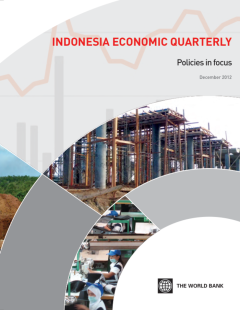
INDONESIA ECONOMIC QUARTERLY December 2012 ; Policies in focus
The "Indonesia Economic Quarterly December 2012" report provides an in-depth analysis of the key economic policies and their impacts on Indonesia's economic landscape. This quarterly publication focuses on the strategic policy measures implemented during the final quarter of 2012 and evaluates their effectiveness in addressing economic challenges and promoting sustainable growth.
- Edisi
- Desember 2012
- ISBN/ISSN
- -
- Deskripsi Fisik
- xii, 50 halaman ; 28 cm
- Judul Seri
- Textbook
- No. Panggil
- 330.05 THE i
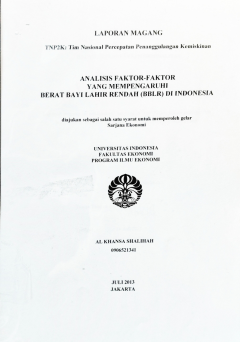
Analisis Faktor-Faktor yang Mempengaruhi Berat Bayi Lahir Rendah (BBLR) di In…
studi yang bertujuan untuk mengidentifikasi dan menganalisis faktor-faktor yang berkontribusi terhadap kejadian berat bayi lahir rendah di Indonesia. Penelitian ini fokus pada berbagai aspek yang memengaruhi berat lahir bayi, termasuk kondisi kesehatan ibu dan faktor lingkungan.
- Edisi
- 1
- ISBN/ISSN
- -
- Deskripsi Fisik
- 41 halaman
- Judul Seri
- Textbook
- No. Panggil
- 330.01 ALK a
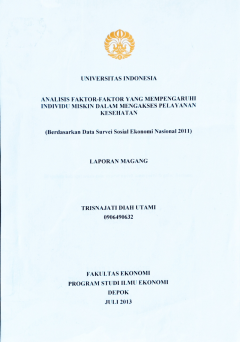
Analisis Faktor-Faktor yang Mempengaruhi Individu Miskin dalam Mengakses Pela…
studi yang bertujuan untuk mengidentifikasi dan menganalisis faktor-faktor yang memengaruhi kemampuan individu miskin dalam mengakses layanan kesehatan. Penelitian ini fokus pada berbagai hambatan dan tantangan yang dihadapi oleh kelompok miskin dalam mendapatkan pelayanan kesehatan yang memadai.
- Edisi
- 1
- ISBN/ISSN
- -
- Deskripsi Fisik
- 61 halaman
- Judul Seri
- Textbook
- No. Panggil
- 330.01 TRI a
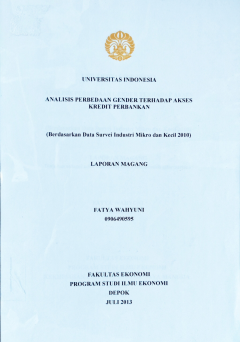
Analisis Perbedaan Gender terhadap Akses Kredit Perbankan
studi yang mengevaluasi bagaimana perbedaan gender mempengaruhi akses terhadap kredit perbankan di Indonesia. Studi ini bertujuan untuk mengidentifikasi dan memahami hambatan serta ketidaksetaraan yang dihadapi oleh berbagai gender dalam mengakses layanan kredit perbankan.
- Edisi
- 1
- ISBN/ISSN
- -
- Deskripsi Fisik
- 49 halaman
- Judul Seri
- Textbook
- No. Panggil
- 330.01 FAT a
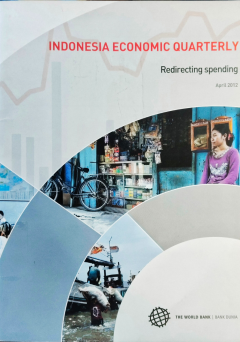
INDONESIA ECONOMIC QUARTERLY April 2012 ; Redirecting spending
International developments continue to shape Indonesia’s near-term economic outlook, but the focus of attention has shifted. In late 2011 the primary concern was the deteriorating and uncertain outlook for the global economy and financial markets. The recent sharp rise in global oil prices has added a new dimension to the situation, raising the projected cost of Indonesia’s fuel subsidies.
- Edisi
- April 2012
- ISBN/ISSN
- -
- Deskripsi Fisik
- xii, 52 halaman ; 28 cm
- Judul Seri
- Textbook
- No. Panggil
- 330.05 THE i
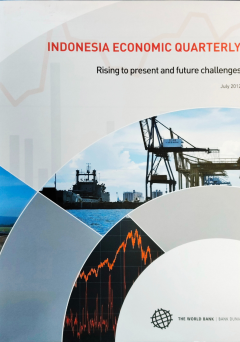
INDONESIA ECONOMIC QUARTERLY July 2012 ; Rising to present and future challe…
However, to date Indonesia’s growth performance has remained solid. GDP growth in the first quarter of 2012 was 6.3 percent year-on-year, down slightly from 6.5 percent in 2011 as a whole. Consumption held up well in the first quarter of 2012, investment growth came down while net exports made a negative contribution to growth.
- Edisi
- Juli 2012
- ISBN/ISSN
- -
- Deskripsi Fisik
- xi, 45 halaman ; 28 cm
- Judul Seri
- Textbook
- No. Panggil
- 330.05 THE i
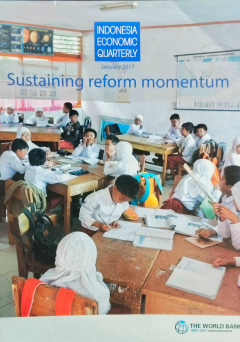
INDONESIA ECONOMIC QUARTERLY January 2017 ; Sustaining reform momentum
Indonesia was among the top 10 improvers globally in this year’s Doing Business report. Indonesia’s ranking improved from 106 in 2016 to 91 in 2017, thanks in particular to a record seven reforms that eased starting a business, getting electricity paying taxes, registering property, getting credit, enforcing contracts and trading across borders.
- Edisi
- Januari 2017
- ISBN/ISSN
- -
- Deskripsi Fisik
- iv, 40 halaman ; 28 cm
- Judul Seri
- Textbook
- No. Panggil
- 330.05 THE i
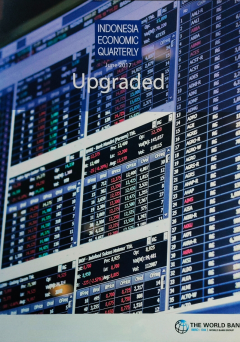
INDONESIA ECONOMIC QUARTERLY June 2017 ; Upgraded
Electricity price hikes in 2017 for 900 VA users have contributed to an increase in inflation to 3.9 percent for the first five months of the year. The effects of higher energy costs have been partially offset by lower food inflation. This year’s inflation is expected to average 4.3 percent, remaining within Bank Indonesia’s inflation target band.
- Edisi
- Juni 2017
- ISBN/ISSN
- -
- Deskripsi Fisik
- iv, 52 halaman ; 28 cm
- Judul Seri
- Textbook
- No. Panggil
- 330.05 THE i
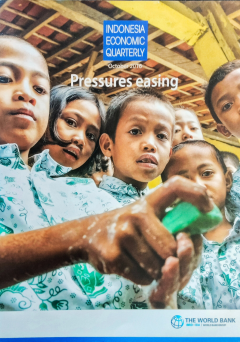
INDONESIA ECONOMIC QUARTERLY October 2016 ; Pressures easing
Tourism is a promising sector to boost the country’s growth. Growth in this sector could help unlock private investment, create jobs, boost exports and guide infrastructure investments. According to the World Travel and Tourism Council, every $1 million in travel and tourism spending supports around 200 jobs and $1.7 million in GDP for Indonesia.
- Edisi
- Oktober 2016
- ISBN/ISSN
- -
- Deskripsi Fisik
- v, 59 halaman ; 28 cm
- Judul Seri
- Textbook
- No. Panggil
- 330.05 THE i
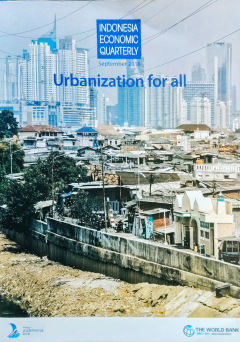
INDONESIA ECONOMIC QUARTERLY September 2018 ; Urbanization for all
Indonesia’s real GDP growth rose to 5.3 percent as domestic demand strengthened. Private and government consumption accelerated thanks to higher subsidy and personnel spending, as well as a pick-up in credit growth, stable inflation and strong job markets.
- Edisi
- September 2018
- ISBN/ISSN
- -
- Deskripsi Fisik
- v, 68 halaman ; 28 cm
- Judul Seri
- Textbook
- No. Panggil
- 330.05 THE i
 Karya Umum
Karya Umum  Filsafat
Filsafat  Agama
Agama  Ilmu-ilmu Sosial
Ilmu-ilmu Sosial  Bahasa
Bahasa  Ilmu-ilmu Murni
Ilmu-ilmu Murni  Ilmu-ilmu Terapan
Ilmu-ilmu Terapan  Kesenian, Hiburan, dan Olahraga
Kesenian, Hiburan, dan Olahraga  Kesusastraan
Kesusastraan  Geografi dan Sejarah
Geografi dan Sejarah